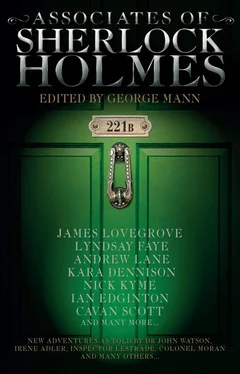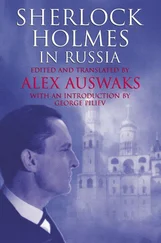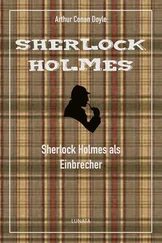The audience had noticed something amiss by now. Some were leaving their seats, but others were craning their necks to get a better view. On stage poor Lear and his Fool were stuttering to a halt.
I saw Holmes swing his fist. The black-clad murderer and blackmailer ducked and twisted, trying to send Holmes falling to his death. The wildly swinging spotlight suddenly played across my face, blinding me momentarily. I heard several shots – the struggle between the two men had probably caused the marksman’s finger to inadvertently tighten on the trigger. I presumed that his plan had been to use the sound of the theatrical thunder to cover the noise of his shot. By the time my vision cleared the audience was panicking, and the marksman had Holmes’s throat in one hand while his other hand was still clutching the rifle. Quentin Furnell had sprung from his seat and was struggling along the row away from me and towards the nearest aisle.
The marksman swung the rifle and caught Holmes in the face. As Holmes automatically raised his free hand to protect himself the marksman swung the weapon around, aiming straight at Furnell’s chest.
“Down!” I screamed at Furnell, abandoning, for the sake of brevity, “Mr Furnell”, which is the Debrett’s approved form of address for a Privy Councillor. I dived towards him and pushed him in the middle of his Right Honourable back. He sprawled forwards, pitching into the velvet seats. I looked back up at the suspended fight, just in time to see a flash of light. Something struck me in the centre of my chest, pushing me back. I fell. My chest felt as if a horse had kicked it. I could hardly take a breath, the pain was so intense.
By the time I could pull myself to an upright position, most of the audience had left and the suspended spotlight and seat arrangement was empty. I clutched at my chest, and found a large hole in my starched shirt, a great deal of shredded leather and silk, and a still-hot bullet, but no blood.
I looked around, and found Holmes sitting a few rows behind me.
“I take it that everything has concluded satisfactorily?” I asked.
“The blackmailer is in custody,” he said, “and, thanks to your actions, the Right Honourable Quentin Furnell is alive and well.” He stared at me, and there was a curious expression on his face. “I sometimes need reminding,” he said, “that events do not always follow their predicted course. Random incidents, such as the inopportune and unintended tightening of a finger upon a trigger, can sometimes lead to unanticipated but tragic outcomes that logic can neither foresee nor prevent. I have learned something today, and for that – and your invaluable help – I thank you.”
I thought about some of the things I had seen as I had looked around the audience earlier – several well-known people together in boxes who should not have been seen together at all, and people with their wives or husbands beside them who had nevertheless been casting loving glances at others nearby. I had made copious notes – mentally, of course – and I could already anticipate a series of columns appearing in the newspapers in the near future.
“Glad to help, Mr Holmes,” I said. “Glad to help.”
THE PRESBURY PAPERS
Jonathan Barnes
I’ve always been fascinated by Professor Presbury– that murky figure at the heart of Doyle’s late addition to the canon, “The Adventure of the Creeping Man” (1923). It’s an often-overlooked case for Sherlock Holmes, as notable as much for what is not stated as for that which is set out plainly by the author. Writing in The Times Literary Supplement in 2010, I suggested that the piece is “a sour parable about the endurance of lust” and that, upon finishing the tale, “the feeling persists that there is something in the narrative – hidden, submerged – which the reader is not permitted to comprehend but which forms the source of its power”.
What a terrific opportunity it was, when I was asked last year to contribute a story to the current volume, to go back into that adventure and to tease out some of its subtext, to dive down towards that which is submerged and bring it up into the light. I’ve often wondered what became of the Professor and have speculated as to where his dark desires might have led him. Holmes, after all, once said of his opponent that, “when one tries to rise above Nature one is liable to fall below it”. I couldn’t help but ask if, having experienced animal passion, the old man could really have walked away from it. Any time spent in seclusion and disgrace, I reasoned, would surely be only temporary. My story imagines the end of such an exile – as well as its final, tragic consequences.
—Jonathan Barnes
From Callitrix, the journal of Sapperson College, Cambridge, Michaelmas Term, 1904
VALE PRESBURY
The college bade a reluctant if heartfelt farewell this term to one of its noblest and most accomplished sons. Professor C.R.H. Presbury, whose fame as an authority in the field of physiology burst long ago the banks of academe to become a national byword for intellectual rigour and clinical expertise, has chosen retirement following a recent, regrettable period of ill health.
His departure was marked by a brief ceremony, which was attended in considerable number by students and fellows and by sundry others whose lives have been enriched through interchanges of various kinds with the professor.
Presbury himself, a notably frailer figure than he who once bestrode the lecture hall, gave a warm speech in which he thanked the college authorities for their exemplary treatment of him in what he called “trying circumstances”. He also regretted deeply the absence of his daughter and her husband (who were, he said, now resident in the Americas) and declared his intention to leave the university town in favour of a small fenland village where he meant to live out his widower days in “contemplation of the highest of life’s callings”. It needs hardly to be said that he shall be missed greatly by all who knew him.
From An Almanac of the Towns, Villages and Hamlets of the East of England (1908 edition)
The overwhelming impression which is acquired during a visit to the village of SEATON LEIGH is one of stark inhospitality. Although not without elements of the quaint and picturesque – its inn, The Upright Badger being, for example, unexpectedly well-stocked and well-appointed – the place boasts a largely taciturn community and a flat fenland landscape. Lone and level fields extend in every direction, studded occasionally by severe dark hedgerows and glowering patches of woodland. There is little to divert that curious traveller who comes in search of the aesthetically pleasing (far better for our wayfarer to journey instead to the nearby homesteads of Baker’s Drive or Graverton) and nothing at all to suggest why, if one were not born to this cold agrarian realm, one should ever choose to make a life for oneself here.
Nonetheless, and against all odds, the village boasts a celebrated resident. Professor C.R.H. Presbury, the once-noted university physiologist, dwells in what was formerly a coaching inn, leading, it is said, an intensely private retirement and taking no part in the business of Seaton Leigh.
I do believe, however, that, during my visitation, I glimpsed him: a tall, defiant figure, stalking into the woods to take his evening constitutional, moving with determined but unfathomable purpose, like some weirdly animate scarecrow.
An extract from the private correspondence between Mr E.S. Foote, proprietor of the Epicurean Bookshop, and Professor C.R.H. Presbury (ret’d)
24th October 1911
Читать дальше












